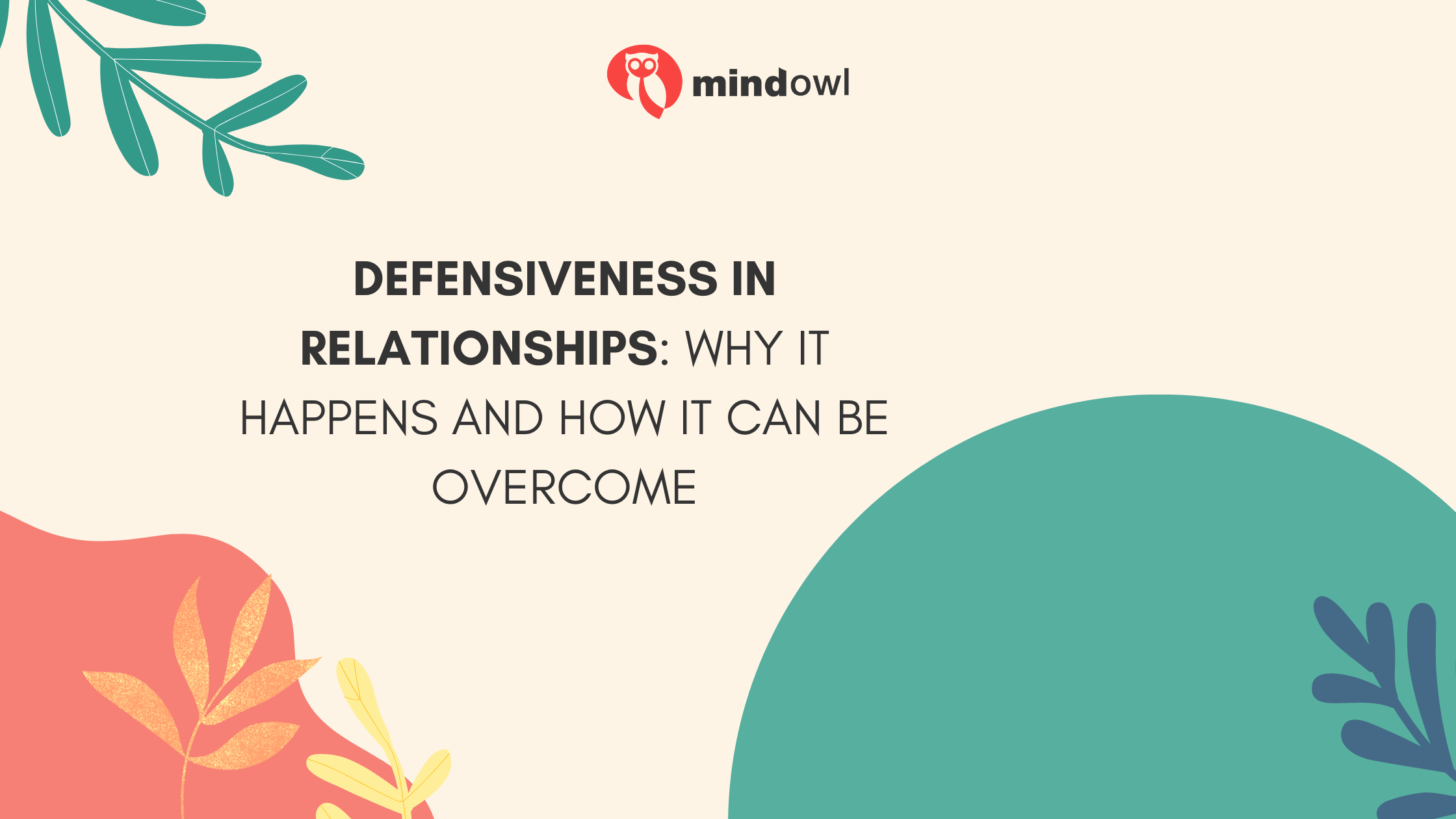Have you ever found yourself getting instantly heated and defensive during a conversation with your partner, even over the smallest things? You’re not alone. Many of us react defensively without fully understanding why, turning simple discussions into full-blown arguments.
Defensiveness is a common reaction in relationships, affecting how we communicate and resolve conflicts.
Interestingly, defensiveness doesn’t just crop up out of nowhere—it’s often a protective mechanism against perceived attacks or criticism. However, while it might feel like it’s safeguarding us, it actually does more harm than good by blocking open communication and creating barriers between loved ones.
This blog will explore the nuts and bolts of why defensiveness occurs in relationships and offer practical advice on how to manage this behaviour effectively. Get ready to transform your conversations!
Key Takeaways
- Defensiveness is a shield we use in relationships to protect ourselves when we feel criticised or attacked. It often comes from childhood experiences or past relationships.
- Recognising signs of defensiveness like immediate denial, counterattacking, and stonewalling is key to tackling the issue. These behaviours stop healthy communication and grow barriers between partners.
- The root cause of defensive behaviour lies in fear and concerns about self – esteem. People worry others might see them as flawed if they accept criticism openly.
- Overcoming defensiveness involves acknowledging your partner’s feelings, taking responsibility for your actions, and improving how you talk with each other. Listening actively and using ‘I’ statements can help reduce defensive reactions.
- Implementing these strategies can transform strained communications into more open, respectful conversations within a relationship, promoting understanding and connection between partners.

Definition and Purpose of Defensiveness in Relationships
Defensiveness is a shield we use to protect ourselves. It springs up when we feel criticised or attacked in our relationships. This shield isn’t just there by accident; it’s a learned response, often from early childhood experiences or past adult relationships.
Its purpose? To deflect and sidestep the criticism thrown our way, making us feel safer. Instead of saying “oops” and taking responsibility, a defensive person might throw up walls of righteous indignation or play the innocent victim.
This reaction comes from feeling sensitive, scared, guilty, or even dishonest at times.
This behaviour makes for terrible listening because the mind is too busy plotting its next move—how to prove innocence or be right—rather than truly hearing what’s being said. Openness paves a distinctly different path; it fosters growth, respect, trust, and freedom in personal connections.
Yet overcoming defensiveness demands recognising these protective instincts for what they are: barriers to deeper understanding and stronger bonds between partners.
Recognising Defensive Behaviour
Recognising defensive behaviour in relationships is essential for fostering healthy communication and growth. Since it’s a learned coping mechanism often rooted in early childhood or adult experiences, understanding how to spot this behaviour can be the first step towards change. Let us delve into the signs that indicate defensiveness:
- Immediate Denial – The knee-jerk reaction is to say “No” or deny any accountability when faced with feedback or criticism. This response is more about protecting oneself than addressing the issue at hand.
- Counterattacking – Instead of responding to the partner’s feelings or concerns, a defensive person might launch a counteroffensive. They might bring up unrelated issues from the past to deflect the conversation away from themselves.
- Rationalising – Offering an array of reasons why something happened instead of acknowledging feelings shows a reluctance to face the situation head-on. It’s an attempt to explain away actions without taking genuine responsibility.
- Sarcasm and Mockery – Using humour inappropriately or being contemptuous can signal defensiveness. It’s often a way to belittle the partner’s feelings or undermine their perspective.
- Stonewalling – Shutting down conversations, refusing to engage, or giving the silent treatment are classic signs of defensiveness and one of the Four Horsemen pointed out by John Gottman as harmful to relationships.
- Victimisation – Portraying oneself as the victim in every scenario enables avoidance of genuine reflection on one’s own role in conflicts or issues within the relationship.
- Justification – Constantly justifying actions without considering the other person’s viewpoints indicates a defence mechanism at play, aiming to shield oneself from perceived attacks rather than understand them.
- Eye-Rolling and Sighing – Non-verbal cues like rolling eyes, sighing heavily, or displaying contemptuous facial expressions during discussions are indicative of defensiveness and disrespect.
- Interrupting – Cutting off your partner mid-sentence not only shows impatience but also a lack of willingness to hear their side, stemming from a defensive stance.
Understanding these behaviours allows individuals and couples therapists alike to identify when defensiveness is hindering communication in relationships. Recognising these patterns is crucial for anyone trying to overcome defensiveness and build healthier ways of relating with their partners.

How Defensiveness Ruins Relationships
Defensiveness creates an impenetrable barrier between partners, making honest communication near impossible. When one person constantly needs to defend themselves, they stop listening effectively, making their partner feel unheard and invalidated – leading to further conflict instead of resolution. Over time, this pattern erodes trust, intimacy and satisfaction as partners become stuck battling each other rather than facing issues together.
Defensiveness breeds more criticism and misunderstanding in a vicious cycle. Instead of a united front, couples find themselves caught in a defensive behaviour that damages their connection. Key ingredients for a healthy relationship – openness, understanding, and a collaborative approach – get lost in the crossfire of defensiveness.
The Vicious Cycle of Defensiveness
A vicious cycle starts when one partner feels attacked and gets defensive. This often leads to the other feeling unheard and becoming defensive too, throwing accusations back and forth in a self-perpetuating cycle that damages their bond. The real issue is this cycle stops both partners from genuinely listening and understanding each other’s perspectives.
Being trapped in this cycle means voicelessness becomes common, with both struggling to convey feelings effectively. Instead of resolving conflicts, they find themselves stuck, unable to reach any understanding. This not only ruins healthy communication but strengthens walls between them, making deeper connections harder.
Root Causes of Defensive Behaviour
Fear lies at the heart of defensiveness – worry about threats to self-esteem or feeling attacked. This fear stems from deeper concerns that others might see them as flawed or unlovable. When someone feels this way, they’re quick to guard themselves, often perceiving criticism where there is none.
Childhood experiences play a big role too. Some don’t get the unconditional support needed early on, making them uneasy in relationships later. They struggle with trust and vulnerability because they’ve learned to always be on guard. These behaviours don’t develop overnight but from longstanding issues with attachment and self-worth.
Strategies to Overcome Defensiveness
Acknowledging and Validating Feelings:
Understanding emotions reduces defensiveness, as people often feel defensive when their feelings aren’t taken seriously. Actively listening and validating emotions, without necessarily agreeing, creates an environment where both partners feel heard and respected. This fosters genuine understanding and connection by providing a safe space to express freely.
Taking Responsibility for Actions:
Accepting responsibility means understanding your role in a conflict, even if partially, instead of deflecting or explaining away criticized behaviour. Admitting mistakes openly, rather than making excuses or blaming others, can stop the cycle of defensiveness and build trust. This honesty paves the way for healing in relationships.
Improving Communication Skills:
Improving self-awareness, using ‘I’ statements, avoiding competing communication, and practising active listening can help manage defensiveness. These strategies promote open, honest dialogue that fosters understanding and empathy, leading to healthier interactions. Taking time to listen without judgment and expressing assertive respect allows for deeper connections.
Conclusion
Defensiveness in relationships can ruin connections and hinder effective communication. However, by acknowledging feelings, taking responsibility for actions, and improving communication skills, defensiveness can be overcome.
Recognising defensive behaviour and understanding its impact are crucial steps in addressing this issue. By implementing these strategies, healthier and more fulfilling relationships can be cultivated.
FAQs
1. What makes us get defensive in relationships?
When we feel attacked or perceive a threat to our self-esteem, defensiveness kicks in. It’s like our mind’s way of protecting us, even if it ends up causing more harm than good in the conversation.
2. How can I spot when I’m being defensive?
You might notice you’re quick to react with excuses, or perhaps you find yourself feeling unjustly accused and immediately trying to shift blame onto your partner. Recognising these signs is the first step towards change.
3. Why do some people seem more prone to defensiveness than others?
Well, it often boils down to past experiences—like childhood trauma—or mental health issues that haven’t been addressed fully yet. These factors can make feelings of defensiveness more intense.
4. Can a relationship coach help with defensiveness?
Absolutely! A relationship coach or therapist can offer insights into why you’re feeling this way and suggest coping mechanisms that don’t involve deflecting or blaming your partner.
5. What are some ways I can stop being so defensive?
First off, try listening fully before responding—this alone can make a big difference. Also, work on building your self-esteem outside of your personal relationship; when you feel better about yourself, you’ll likely be less sensitive to perceived criticism.
6. Is overcoming defensiveness really possible?
Definitely! With effort and maybe some professional guidance, anyone can learn healthier ways of dealing with conflict discussions without resorting to hurtful defensive behaviour.
MindOwl Founder – My own struggles in life have led me to this path of understanding the human condition. I graduated with a bachelor’s degree in philosophy before completing a master’s degree in psychology at Regent’s University London. I then completed a postgraduate diploma in philosophical counselling before being trained in ACT (Acceptance and commitment therapy).
I’ve spent the last eight years studying the encounter of meditative practices with modern psychology.

